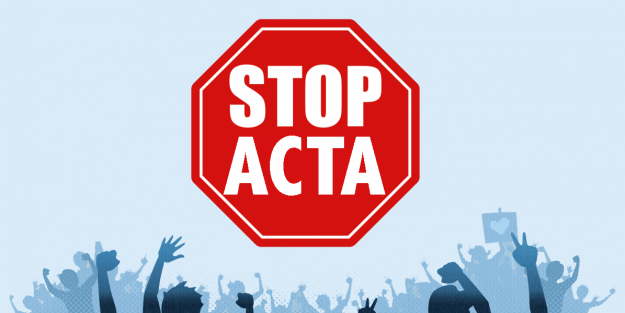ACTA bombshell: Germany refuses to sign anti-piracy treaty amid protests

In a potentially fatal blow to the Anti-Counterfeit Trade Agreement (ACTA), Germany’s Foreign Office announced today that it will not sign the contentious treaty as protests heat up in 200 cities across Europe. Germany, which has the largest economy in the European Union, follows in the footsteps of Latvia, Poland and the Czech Republic, which signed ACTA, but later said they would block ratification of the treaty.
If ratified by the European Parliament, ACTA would set strict international standards for intellectual property law, and create a new governing body to oversee the enforcement of those laws, which would target counterfeit goods, generic medicine, and copyright-protected digital goods, like music, film and television shows. Without Germany’s support, the ratification of ACTA becomes far less likely.
Spearheaded by the US and Japan, ACTA first drew ire around the world due to the intense secrecy that surrounded the treaty. The text of the agreement was negotiated outside standard international bodies, like the World Trade Organization, the United Nations, and the World Intellectual Property Organization. This allowed governments involved in the negotiations to bypass the scrutiny of the public.
Once the text of ACTA was made public last month, opposition to the agreement exploded. Protests erupted across countries in Europe. Kader Arif, a member of the European Parliament who was tasked with overseeing the final stages of ACTA’s passage, resigned in opposition to the treaty.
Were ACTA to be ratified, it would require countries to create intellectual property laws that mimic — or exceed — US copyright regulations, which are far more strict than what most countries currently have in place. Criminal penalties for infringement would be increased under ACTA, and Internet Service Providers (ISPs) would be encourage to conspire with rights holders to create penalties for copyright infringers. It would do all this without also requiring countries to adopt consumer protection laws, or other safety valves, like fair use or public domain policies. ACTA critics say the harsh regulations could stifle free speech, and hamper online innovation.
In addition, ACTA would empower border officials to confiscate any goods they believe may be in violation of copyright law, and allow private copyright holders to request the seizure, and even destruction, of allegedly infringing goods. This is particularly problematic for the distribution of generic drugs — many of which are not in violation of copyright law — such as HIV medication en route to developing nations that are in dire need of such drugs.
While ACTA would not specifically change US copyright law, it could prevent Congress from making US intellectual property regulations less severe without the risk of jeopardizing trade relations with other countries. The White House asserts that this would not be the case, since President Obama deemed ACTA an “executive agreement” — not a treaty — which means the US can ignore the agreement if necessary. (The “executive agreement” designation also meant ACTA did not have to be ratified by the Senate, thus allowing its contents to remain secret — a move some in Congress say was unconstitutional.) Unfortunately, most other countries do consider ACTA a treaty, so the White House’s argument on the matter may be moot.
ACTA will be voted on for ratification by the European Parliament in June. All 27 EU countries must sign the treaty for it to be ratified.
To learn more about the controversy surrounding ACTA, see here, here, and here. To read the final text of ACTA, click here.
This article was originally posted on Digital Trends
More from Digital Trends
Anonymous exposes data from neo-Nazi hunt on new ‘Nazi-Leaks’ site
Jumping 3D printed spider-bots created to help save lives not enslave them
German officials admit to using R2D2 Trojan to spy on citizens

